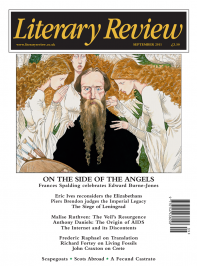Timothy Brook
Trading Places
1493: How Europe’s Discovery of the Americas Revolutionized Trade, Ecology and Life on Earth
By Charles C Mann
Granta Books 535pp £25
Is there any need to go back to Columbus yet again? Science journalist Charles Mann thinks so, though not for the usual purpose. He first went back to 1492 in fact six years ago with his book 1491, a survey of the rich ecology of Native life in the Americas just before its isolation ended. That book was a memorial to the world we lost when the Americas were integrated with Europe, Africa and Asia. 1493 presents us with the world we gained as a result. The book is not really about 1493 nor, thankfully, 1492. Mann does quickly revisit the Columbus fetish, but he soon moves on to explore what happened through later centuries as the New World became part of the world. His guide in this project is Alfred Crosby. Four decades ago Crosby published his first book on what he dubbed the ‘Columbian exchange’, the movement of microbes and other biota into and out of the Americas subsequent to Columbus’s landfall. A second book a decade later explored the ecological rearrangement of the globe produced by these movements, coining the equally memorable term ‘ecological imperialism’. Mann not only acknowledges his debt to Crosby but sought him out. When he urged his mentor to pull together the new environmental history that has since been done and bring his work up to date, Crosby countered with the suggestion that Mann take up the task – hence this book.
The inadvertent biological movements that constituted the Columbian exchange are but one type of exchange that Mann goes in search of. Another is economic exchange, in particular the global networks of trade that became possible with the circulation of materials from ‘Columbian’ sources: tobacco, potatoes, rubber, sugar, and

Sign Up to our newsletter
Receive free articles, highlights from the archive, news, details of prizes, and much more.@Lit_Review
Follow Literary Review on Twitter
Twitter Feed
Under its longest-serving editor, Graydon Carter, Vanity Fair was that rare thing – a New York society magazine that published serious journalism.
@PeterPeteryork looks at what Carter got right.
Peter York - Deluxe Editions
Peter York: Deluxe Editions - When the Going Was Good: An Editor’s Adventures During the Last Golden Age of Magazines by Graydon Carter
literaryreview.co.uk
Henry James returned to America in 1904 with three objectives: to see his brother William, to deliver a series of lectures on Balzac, and to gather material for a pair of books about modern America.
Peter Rose follows James out west.
Peter Rose - The Restless Analyst
Peter Rose: The Restless Analyst - Henry James Comes Home: Rediscovering America in the Gilded Age by Peter Brooks...
literaryreview.co.uk
Vladimir Putin served his apprenticeship in the KGB toward the end of the Cold War, a period during which Western societies were infiltrated by so-called 'illegals'.
Piers Brendon examines how the culture of Soviet spycraft shaped his thinking.
Piers Brendon - Tinker, Tailor, Sleeper, Troll
Piers Brendon: Tinker, Tailor, Sleeper, Troll - The Illegals: Russia’s Most Audacious Spies and the Plot to Infiltrate the West by Shaun Walker
literaryreview.co.uk